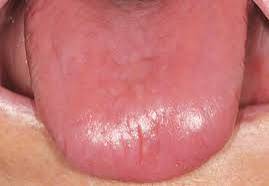An anemia-related tongue (or glossitis due to anemia) refers to tongue inflammation or changes resulting from various types of anemia, such as iron-deficiency anemia, pernicious anemia, or folate deficiency anemia. Anemia affects the tongue by reducing oxygen flow and causing nutrient deficiencies that impact tongue health.
Causes
Anemia-related tongue changes are usually due to deficiencies that impact red blood cell production or oxygen delivery:
1. Iron-Deficiency Anemia - Low iron levels reduce hemoglobin, limiting oxygen delivery to tissues, including the tongue.
2. Vitamin B12 Deficiency - B12 is essential for red blood cell production and nerve health; its deficiency can lead to a sore or swollen tongue.
3. Folate Deficiency - Folate is crucial for cell division and red blood cell formation. Its deficiency can lead to tongue inflammation.
4. Chronic Disease - Conditions like kidney disease, cancer, or rheumatoid arthritis can lead to anemia and tongue symptoms.
Signs and Symptoms
Pale or Smooth Tongue - The tongue may appear pale due to reduced blood supply, or smooth from loss of papillae (tiny bumps on the tongue surface).
Soreness or Swelling - An anemic tongue may feel sore, tender, or swollen, making it uncomfortable to eat or speak.
Glossitis - The tongue may become inflamed, red, or shiny, especially in B12 deficiency anemia.
Cracks or Fissures - In severe cases, the tongue may develop small cracks, and the corners of the mouth may be affected.
Effects
1. Discomfort with Eating - A sore or swollen tongue can make it painful to eat, especially with spicy, acidic, or salty foods.
2. Altered Taste - The loss of papillae or inflammation can reduce taste sensation.
3. Nutritional Deficiency Worsening - Difficulty eating may reduce appetite, further worsening nutritional status.
4. Potential for Oral Infections - An inflamed or sore tongue is more susceptible to secondary infections, such as thrush.
Solutions and Management
1. Identify and Treat the Underlying Anemia
Consult a healthcare provider to diagnose the type of anemia. Blood tests can determine whether the cause is iron, B12, or folate deficiency, or another condition.
2. Dietary Changes
Iron-Rich Foods: Increase intake of iron-rich foods like red meat, poultry, beans, spinach, and fortified cereals.
B12-Rich Foods: Include eggs, dairy products, meat, and fortified foods if B12 deficiency is identified.
Folate-Rich Foods: Add leafy greens, beans, nuts, and citrus fruits to your diet for folate.
3. Supplements
Based on medical advice, take iron, B12, or folic acid supplements to address deficiencies. Always follow dosage recommendations, as excess iron or B12 can have side effects.
4. Good Oral Hygiene
Practice gentle oral care to avoid irritating the tongue further. Brush with a soft-bristled toothbrush and consider using a mild mouthwash if needed.
5. Avoid Irritating Foods
Stay away from acidic, spicy, or salty foods that may aggravate a sore tongue. Opt for softer, cooler foods that are easier on the mouth.
6. Stay Hydrated
Drink plenty of water, as hydration can reduce dryness and discomfort in the mouth.
7. Regular Medical Follow-Up
Follow up with a healthcare provider to monitor anemia and ensure that treatment is effective, especially if symptoms persist.
When to See a Doctor
If you notice persistent changes in your tongue, such as paleness, soreness, or swelling, and suspect anemia, consult a healthcare provider for evaluation. Early treatment of anemia and any associated symptoms can prevent further complications and improve your overall health.


